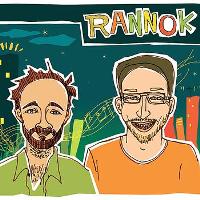Traditional and contemporary Danish music for fiddle and piano.
Denmark comprises the Jutland peninsula and 406 islands, big and small. The third biggest island, Funen (Fyn), lies between Jutland and Zealand and is home to about a half million of Denmark's 5.5 million inhabitants.
Funen is best known as the birthplace of fairy-tale author Hans Christian Andersen, of the great composer Carl Nielsen, and for its vibrant folk music scene. Situated in Odense, Funen's main city, is the The Academy of Music and Dramatic Arts, Southern Denmark, offering Denmark's only diploma course in folk music. Round Funen are dotted music venues of all descriptions, and no fewer than four folk music festivals: Strib Winter Festival, Fåborg Folk Festival, Odense Folk Festival and the Hoejby Gathering. It is on this beautiful island that the story of the young Danish fiddle and piano duo Rannok has its beginnings.
Michael Graubæk, the fiddler, grew up on Funen, where his parents were deeply involved in the local music scene both as musicians and as dancers, and the music soon became a natural part of their son's life. While studying at The Academy of Music and Dramatic Arts, Southern Denmark, Michael and pianist Theis Langlands started the Rannok duo, playing what has been described as 'a masterly blend of fiery folk music, authentic traditional tunes, and original compositions which give that contemporary touch.' Michael Graubæk explains:
"I have been playing the fiddle since early childhood. My parents were folk dancers and my father was a fine instrumentalist, so the music was an integral part of daily life. At my confirmation party, or whenever there was a major celebration, a 40th birthday or whatever, folk musicians homed in. In 2003 I started the folk music course in Odense, and there I ran into the pianist Theis Langlands. We became good friends, started our duo and chose the the name Rannok, which is a special Funen dialect word meaning "really good" or "true"."
Rannok released their first album in 2010, dedicating it to both the Danish folk music tradition and to innovation. Since then the duo have played at venues and festivals in Denmark, Sweden, Switzerland and all over Scotland, where they have met with particular audience approval. In fact Rannok's first album was partly financed by Scottish fans who thought it high time they produced a cd.
Rannok are inspired by the old masters, people like Ole Kjaer, one of the greatest Danish fiddlers of the 1800s, also known as the Paganini of West Jutland. He was famous for his virtuosity on his instrument, for his talent as a composer, and for his wild entertainment stunts: he could play his fiddle over his head, juggle and turn cartwheels down the room.
Nils Andersson, known as Swedish Nils, a Swedish immigrant who became another of Denmark's great fiddle heroes of the 1800s, was another source of inspiration. A brilliant musician, he composed such favourites as The Devil in the Peat Bog, The Apology Polka, The Hardening Waltz. It was said of Swedish Nils that "he could play the lice out of folks' buttonholes."

"When we are composing our own music, we are influenced by the traditional sound of Danish music and the Scots as well. Theis is married to a Scots girl and has lived in Scotland, so we know the music. A couple of hundred years back, the Danish and British traditions were closer than they are today, and that's the sound we're aiming for. We work at maintaining a traditional sound, but we combine it with our own ideas and arrangements, and compose extensions to old tunes if that's what's needed. We make the music our own."
Michael Graubæk and Theis Langlands both play in other musical contexts, both folk music and other styles. Michael has studied and played with some of the finest living Danish folk musicians, such as Hans Jørgen Christensen and Klaus Pindstrup, and Theis is part of the folk big band Habadekuk. But what is it about traditional music that they find so fascinating?
"If you ask why we keep to a traditional sound, then basically it's down to my upbringing in folk music. This is MY music and it's the Danish tradition, but the same is true when we are leaning on the Scottish tradition, there's something special about traditional music. If you go into a bar in Scotland and start playing traditional music, the folk in the pub react immediately to the music, and that's what folk music does, that's the best thing about it. You touch something - a tone maybe - in your listeners, you touch part of their history and their musical taste, their love of music, and no music is so loved as folk music. Folk music is simply a part of our own history and tradition, and that's why we play - we just have to do it."
Rannok is one of the newest and most exciting new shoots on the Danish folk music tree, and they will be representing Danish folk music round the world. Seize the opportunity, invite your friends, and turn up at your local music venue next time Rannok are on the bill. Remember what the young Danish fiddler said: "No music is so loved as folk music!"
Translated by Rod Sinclair.
Photo Credits: (1)-(2) Rannok (from website).